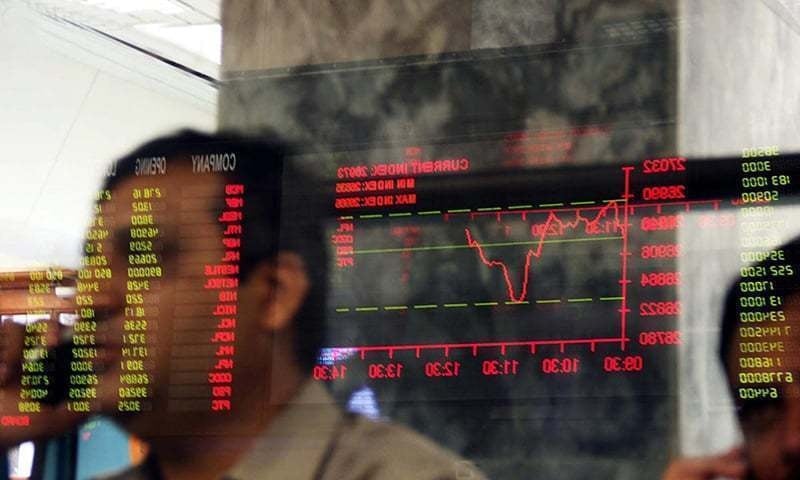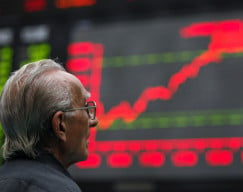
Bears on Tuesday took control of the Pakistan Stock Exchange as the benchmark KSE-100 index received a heavy battering on the back of a weakening macroeconomic environment in the country.
Investors failed to find any positive cue amid multiple negative news reports and as a result the KSE-100 index dived below 47,000 points.
Speculation about delay in the International Monetary Fund (IMF) loan tranche for Pakistan and mounting inflationary concerns marred the trading atmosphere.
The rupee’s slide against the greenback in the inter-bank market coupled with surging global coal prices and foreign fund outflows made market participants sceptical, who opted for profit-taking.
The session started on a weak note as investors offloaded their holdings, leading to a steady decline in the KSE-100 index. A brief buying spell emerged near midday, however, the market was unable to sustain it.
Later in the day, the index remained range bound and traded with minor ups and downs.
At close, the benchmark KSE-100 index recorded a decline of 715.13 points, or 1.52%, to settle at 46,399.91.
Arif Habib Limited, in its report, said that a “bloodbath” was witnessed at the Pakistan bourse due to further weakening of Pakistani rupee against the US dollar, concerns over inflation and resumption of foreign selling spree.
The market opened on a bleak note after news in the morning that the revival of $6 billion stalled IMF programme hinged on clearance from the fund’s two departments before forwarding it to the Executive Board.
Textile sector continued to remain under pressure for a second consecutive session over concerns about an end to the subsidised gas supply.
Institutional activity remained on the selling side due to redemptions by the mutual fund industry.
Stock accumulation was witnessed in the banking sector as Kibor rates had risen sharply in the past one month, where the spread between six-month Kibor and the policy rate touched a high of 162 basis points, increasing from the average spread of 50 basis points.
In the last trading hour, sell-off was witnessed across the board primarily because investors adopted a cautious approach.
Sectors contributing to the performance included commercial banks (-123 points), cement (-102 points), technology (-79 points), exploration and production (-63 points) and power (-46 points).
JS Global analyst Waqar Iqbal said that the KSE-100 index went towards the red zone since the start of trading session on news of uncertainty about IMF discussions, increase in gas prices for the industrial sector, government-opposition rift and inflationary concerns.
All these reasons led the index to the intra-day low of 46,307 (-808 points).
“A cautious approach is recommended as the market is likely to closely follow the upcoming MPS (monetary policy statement) announcement, weekly inflation reading, developments about the IMF programme and MSCI (Morgan Stanley Capital International) rebalancing this month,” the analyst said.
Overall trading volumes increased to 434.7 million shares compared with Monday’s tally of 364.9 million. The value of shares traded during the day was Rs14.3 billion.
Shares of 359 companies were traded. At the end of the day, 48 stocks closed higher, 296 declined and 15 remained unchanged.
Telecard Limited XB was the volume leader with 33.5 million shares, losing Rs0.02 to close at Rs19. It was followed by Fauji Foods (R) with 28.8 million shares, losing Re1 to close at Rs3.28 and First National Equities with 25.4 million shares, gaining Re1 to close at Rs11.04.
Foreign institutional investors were net sellers of Rs121.04 million worth of shares during the trading session, according to data compiled by the National Clearing Company of Pakistan.

1722586547-0/Untitled-design-(73)1722586547-0-165x106.webp)


1732326457-0/prime-(1)1732326457-0-165x106.webp)




1719053250-0/BeFunky-collage-(5)1719053250-0-270x192.webp)







COMMENTS
Comments are moderated and generally will be posted if they are on-topic and not abusive.
For more information, please see our Comments FAQ